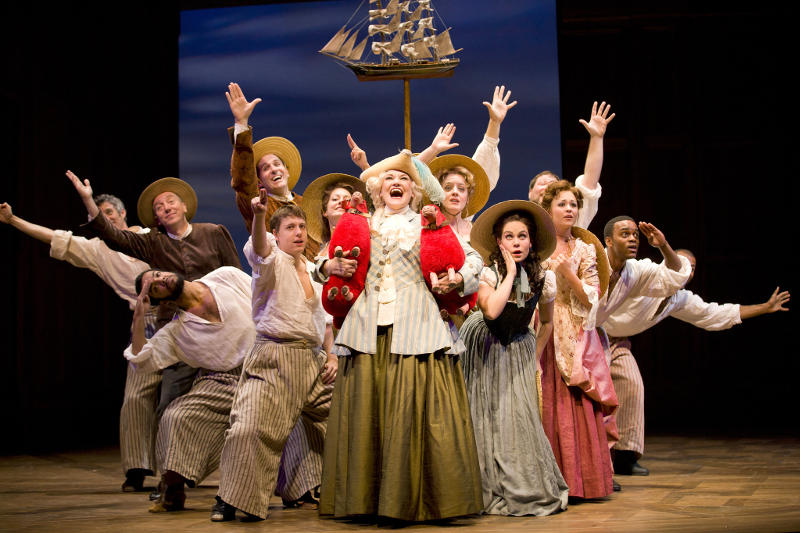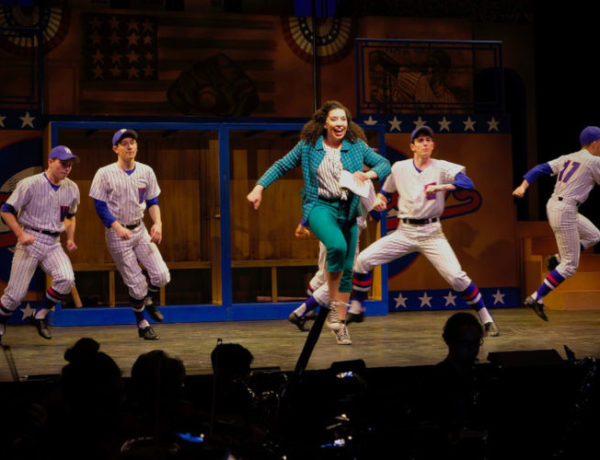It’s official: your theater group is putting on a musical! It’s time to choose the show, but suddenly, you’re overwhelmed — with so many wonderful options, how do you pick a musical that’s right for your theater?
You might also like:
Most theaters have non-negotiable limitations in terms of budget, casting, space, and technical capability. To further complicate matters, no two musicals are created equal; Avenue Q is an entirely different animal than My Fair Lady. As you choose the top contenders, use these 7 steps to find the musical that satisfies your artistic and realistic requirements.
Top image courtesy of The Huntington under CC BY 2.0
1. Ask other local theaters about their upcoming seasons
Chances are, you share at least part of your audience with other local theater groups. To make sure that you’re not putting on the same musical in the same year, take time to find out what other theaters are doing. That way, you don’t have to worry about competing for audience members. Plus, you’ll create goodwill and open communication in the local arts community. Everybody wins!
This step is particularly important if you live in a small town, but it’s a great way to ensure a varied and dynamic theater scene in cities of any size.
2. Make sure you can cast the musical
Casting is the most important factor in choosing a musical. When you pick a show, you should be confident in your ability to find an actor for every role. If you usually have 20 people come out for auditions, don’t pick a musical with a huge cast. (West Side Story and Anything Goes come to mind.) Instead, choose a musical with a small cast. (See: 5 Small Cast Musicals)
Want to do a big dance musical, like A Chorus Line or Dames at Sea? Make sure you have a choreographer on board before you commit.
It’s also important to think about the singers in your talent pool. Does the leading role require a high, classically trained soprano or a strong, high-voiced tenor? Make sure you have singers who can hit all of the notes. Some shows, like The Secret Garden, have incredibly challenging music. If your principal actors can’t hit the notes, they’ll be insecure and unhappy — and your audiences won’t like it, either.
The same is true if you want to do a musical with lots of belting (Kinky Boots); make sure you have people who can sing in that style.
3. Pick a musical that fits your budget
Musicals are expensive. In comparison to plays, they come with higher licensing fees. Plus, you’ll need to shell out to rent the scripts, scores, directors’ materials, and orchestra parts. Some of the other costs include:
- Gels for special-effect lighting
- Supplies for building and painting sets
- Rental fees for drops
- Rehearsal space
- Costumes
- Fees for choreographers, directors, etc.
- Advertising costs
- Printing posters and programs
- Rehearsal accompaniment tracks
The bigger and more specialized the show, the more expensive it gets. If you’re working with little to no money, choose a musical that’s in the public domain to save on licensing fees — this includes all Gilbert and Sullivan operettas. Another option? Pick a musical that you can do with a bare-bones set, such as Company or You’re a Good Man, Charlie Brown.
4. Think About Costumes
Costumes are part of what makes a musical exciting and fun — but they can also eat up a great deal of money and time.
If you’re on a shoestring budget, don’t pick a musical with big, intricate costumes that are essential to the show — think Beauty and the Beast or The Wizard of Oz. The same goes for period musicals such as My Fair Lady or shows that require specific costumes, such as the nuns in The Sound of Music or the marching band in The Music Man. Instead, limit your search to shows where actors can wear their own clothes, such as Rent, Next to Normal, or The Last Five Years.
Here are some questions to ask:
- Can your theater group afford to rent costumes? Is the board willing to spend the money?
- If you’re planning to make costumes, do you have volunteers who can sew clothing?
- Can you borrow specialized costumes from a school or another organization? (band uniforms, military uniforms, etc.)
5. Find out what your audience wants
Most theaters rely on ticket sales to make up at least part of the cost of putting on a musical. If that’s true for your group, take the audience’s interests into consideration. A survey is a great way to do this — list your top choices and ask respondents to rank them. Send the survey to your email list and post it on Facebook; the results might surprise you.
It’s also helpful to compare ticket sales for past shows. Do you tend to have bigger audiences when you do well-known musicals? Do local theatergoers show up for offbeat shows? When revenue is crucial, it makes sense to pick musicals that resonate with your audience.
When in doubt, choose a musical with lots of kids in the cast (Annie, The Sound of Music) — the audience will be packed with parents, grandparents, aunts, and friends. You’ll also bring in local families, which means higher ticket sales.
Is your theater on solid financial footing? Go ahead and push the envelope with an edgy or little-known title. Put a bit of extra marketing energy behind it and see what happens! (See our favorite theater marketing tips.)
6. Figure out technical theater requirements before you pick a musical
Technical requirements are some of the most-overlooked factors when choosing a musical. Head off potential conflicts by bringing your technical director into the loop. That way, you’ll know right away if you have the gear and the space for your top picks.
Some things to consider:
- Do you have enough body mics for the principal cast?
- Can you handle special effects: fog, magical transformations, puppet operation?
- Is the theater rigged to fly actors?
- Do you have space in the wings to accommodate large sets between scenes?
7. Check Licensing Requirements and Restrictions
When you’ve narrowed the options to three or four top choices, it’s time to look into licenses. To start, make sure the show is available through a company like MTI or Concord Theatricals. If a musical is fresh off a Broadway run, there’s usually a waiting period before the rights are released.
Your location can also affect availability — if a national tour is holding the rights in your area during your anticipated performance dates, you might be denied a license. Professional theaters may also reserve the regional rights to a specific musical.
These issues can arise unexpectedly, so it’s always a good idea to have a few backup options on deck.
Producing a musical is a wonderful artistic challenge — but it also involves a number of practical factors. When you take the time to think through your theater’s limitations and requirements, it’s easier to pick a musical that suits your actors, production team, and audience.




